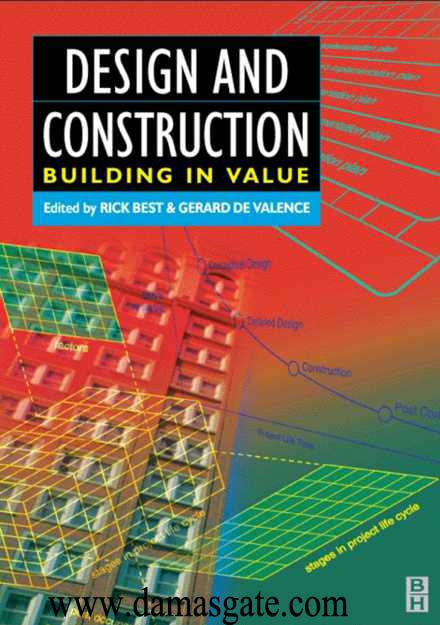Design and Construction Building in Value

Design and Construction:
Building in Value
edited by Rick Best and Gerard de Valence
University of Technology Sydney
Preface
This is the second book in a series devoted to the concept of value in buildings, and how
those who involved in building procurement may ultimately produce buildings that
represent the best ‘value-for-money’ outcomes. Like its precursor, Building in Value: Predesign
Issues,
it is intended both for students in construction- and property-related courses
at
the tertiary level and as a useful resource for industry professionals: property
developers,
project managers and cost engineers among others.
Once again a wide range of topics have been included, however, the design and
construction of buildings is a broad and complex area and no single book could cover all
the relevant areas. Once again, though, it brings together in one volume an introduction
to many of the parts of the building procurement process that make up the design and
construction phase. The reference and bibliography lists at the end of each chapter point
readers to a wealth of related material and will thus facilitate in-depth self-directed study
of selected topics, while the editorial comments that precede most of the chapters tie the
content of individual chapters to the central theme of ‘building in value’.
The book is broken into three parts: the first is a review of recent trends and changes
in building procurement, the second examines specific functional and procedural issues,
while the third looks to the future and examines some of the innovations that are emerging
in areas such as the production of ‘space age’ materials, automation of the construction
process and new methods of space conditioning.
Contributions have come from many countries including Australia, New Zealand,
Singapore, the USA, England, Scotland and Finland, and the authors once again include
academics and practitioners.
The first book in the series has been a success as it gives readers a convenient onevolume
reference that provides a basic but solid grounding in the topic areas covered by
the
various authors. We
believe that this book will serve a similar purpose and hope that
students
and professionals will find it equally useful.
Rick Best
Gerard de Valence
November 2001
Foreword
As US architect Frank Lloyd Wright wrote in the New York Times Magazine (4 October 1953):
The physician can bury his mistakes, but the architect can only advise his clients to plant vines.
In the last 50 years, buildings have become more complicated, technology has
continued at a relentless pace, work practices have changed, litigation abounds,
globalization is a fact of life and we are all swamped with information.
So why read another book about building best value buildings?
The simple answer is that this book is vital to enhancing your knowledge. Today’s
professional has to keep abreast of all the new developments in design, technology,
building codes, and new materials and processes. Rick Best and Gerard de Valence have
hit on the winning combination of knowing a lot about the design and construction
industry and bringing together experts to write about the important issues in building
today. Their last book, Building in value: pre-design issues, used the same format and has
proved very successful. The editors have moulded a diverse range of topics into a coherent
and interesting text.
Everybody likes to think they are operating at the leading edge of their subject area,
whether it be design, cost management, materials technology, or construction. If you want
to stay at the leading edge, then you must read this book – it has taught me a lot about a
wide range of topics. Remember – you don’t know what you don’t know!
But building in value for whom? For the investor, developer, owner, designer,
contractor, specialist contractor, or supply chain, who all played a part in the design and
construction phases? Or for the customers, and the customers’ customers who will be
involved in the whole life of the building? The editors have clearly considered these
questions and have compiled a collection of expert views that cover the whole spectrum
of construction, from inception to construction to operation.
Today’s speed of change in new materials and communication technologies means we
can no longer use the events of the past to predict the future. However, whatever the speed
at which new technology is created, the changes are incremental, they do not all happen
at once. Take, for example, the construction of tall buildings in the world: Petronas Towers
in Kuala Lumpur relied upon advances in lift manufacture, e-commerce relies upon faster
and faster processor speeds and communication advances, while nanotechnology provides
an opportunity for scientists to make single molecules act like transistors – which makes
computers the size of a sugar cube a possibility!
The book recognizes the speed of change and includes sections on managing change
and innovation, and future technologies, as well as dealing with today’s issues of
constructability, occupational health and safety, lean construction, cost management,
waste management, and quality assurance.
The book represents value for money for both students and professionals alike.
Roger Flanagan
The University of Reading
Download
http://s18.alxa.net/s18/srvs2/01/Des...g.in.Value.rar